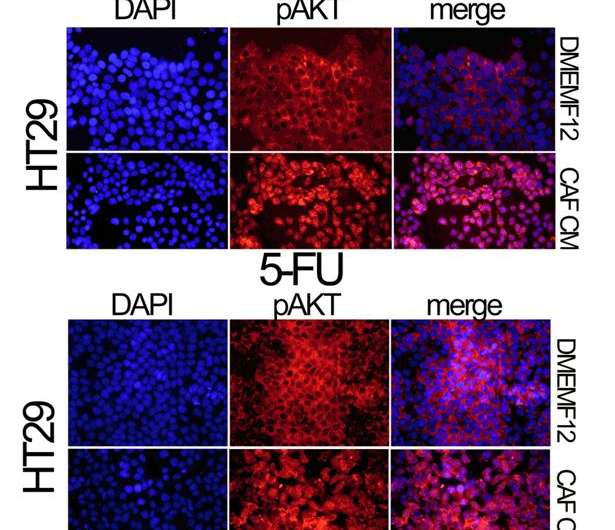Tumor microenvironment acts as a mechanism of resistance to chemotherapy

Researchers at Bellvitge Biomedical Research Institute (IDIBELL) have published a study in Oncotarget that highlights the importance of the tumor environment as a source of resistance to treatment in colorectal cancer, the fourth most common cancer and the leading cause of cancer death worldwide. The article describes how the presence of certain molecules in the environment of the tumor triggers processes that protect the tumor cells from the action of conventional chemotherapy. Resistance to treatment is one of the main obstacles that patients face during the course of the disease; therefore, understanding the mechanisms by which it develops is essential to improve the prognosis.
Carcinoma associated fibroblasts (CAFs) are a type of normal cell closely associated with primary tumor cells. The study led by Dr David G. Molleví reports that certain cytokines, chemokines and other soluble factors secreted by CAFs induce processes that slow down the cell cycle, affecting the proliferation of tumor cells. In the presence of conventional chemotherapy, such factors allow stabilization and activation of selected downstream proteins that minimize the effectiveness of the treatment. However, it has also been reported that inhibition of the JAK/STAT signaling pathway, addict to many of these cytokines, might revert the process.
The importance of the tumor microenvironment (TME) as a relevant contributor to cancer progression and its role in the development of resistance to therapies has become increasingly apparent to researchers. "Although current cancer research mainly focuses on therapies against specific targets, most tumors are still treated with conventional cytotoxic therapies, so drug resistance remains the main obstacle to their success," explains Dr Molleví.
"From a clinical perspective, identifying the soluble factors that mediate such microenvironment-mediated drug resistance might yield valuable information to circumvent it," says Dr. Molleví. "Hampering key cells responsible for the synthesis of such factors might be an interesting approach to avoid the protective effect exerted by such molecules and to render tumor cells sensitive to chemotherapy."
More information: Samuel Gonçalves-Ribeiro et al, Carcinoma-associated fibroblasts affect sensitivity to oxaliplatin and 5FU in colorectal cancer cells, Oncotarget (2014). DOI: 10.18632/oncotarget.11121


















